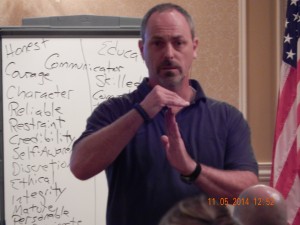Many people think obedience means merely following instructions. In other words, someone in authority gives you an order or directive and you follow it. But what if your authority is “out from under authority?”
One of the criticisms we often face when teaching the principle of authority is that we are advocating blind obedience. Nothing could be further from the truth. We recognize that there are times when an authority has made a bad decision and it is proper to make an appeal….
In order to make an appeal in court, there must be constitutional or procedural grounds. Otherwise there is no basis for the appeal. You cannot make an appeal simply because you disagree with the decision. In fact, the character test for obedience is often found in your willingness to follow directions that you disagree with.
In a character-based organization, “grounds” fall into two categories: ethical violations or additional information. If your authority instructs you to violate a clearly defined ethical or legal standard, you have grounds to make an appeal. And to respectfully disobey if necessary.
More often… you have additional information that may influence your authority’s decision. In this case, you have grounds to bring this information to their attention. Examples could be pointing out a consequence of the decision that your supervisor may not have considered. Or, it could be informing them of a prior conflicting instruction that you had received from another supervisor. Or, maybe there is a well-established law or policy that prohibits that course of action.
In addition to having grounds for an appeal, you must also have “standing.” In other words, you must be in a lawful position to address the court. The same is true in making an appeal to an authority. Your standing is established through your reputation of good character. If you have been a faithful and loyal employee, then you have the right to make an appeal.
Sheriff Ray
The new Police Dynamics blog has already generated some interest after only 24 hours! Thanks to those of you who have taken the time to subscribe and to comment.
One of the topics I see talked about a lot in the blogosphere is the definition of character. We can go to the dictionary but a good working definition is a bit elusive. It’s a lot like pornography — you know it when you see it (I know, bad example. But there was actually a Supreme Court decision that ruled that way…).
Or maybe more importantly — you know it when you don’t see it.
Either way, it’s sometimes hard to pin down a definition.
I’ve heard this one quite a bit: “Character is who you are when no one else is around.” This captures a piece of the pie, but I like to add “… and you don’t think you’re going to get caught!”
The definition I have used in Police Dynamics training over the years comes partially from the folks at the Character Training Institute. They say “character is the inward motivation to do the right thing regardless of the circumstances.” I like this definition, too. But it was pointed out to me in a recent comment that this is a description of “good character,” because your character can be either good or bad.
I also like to add to this definition the following phrase – “… and regardless of the costs.” Because sometimes doing the right thing might cost you something. It could cost you a friend; it could cost you a court case; or it could cost you your job. Men and women of true character are willing to pay the price.
Many of you have already paid the price of good character many times over, and I applaud you for it. Thanks for setting such a good example. And feel free to share some of your experiences here, by the way.
And be sure to keep track of my blog by subscribing to the email feed for future posts. I’ve got some more good stuff coming.
And remember to “Keep up the good character!”
Sheriff Ray
The Character Training Institute did an excellent job producing this Intro video that shows the link between Police Dynamics and Character First! Pay close attention to the “man on the street” interviews. People really do think about police that way…!
Since making the decision to retire as Sheriff of Dorchester County, my wife and I have been seeking God’s leadership in determining what should be my next “mission.” This quest has led me to seek a position overseas as a Police Mentor in Afghanistan. Needless to say, we are excited about this assignment and the opportunities it presents.
However, most of the information regarding my assignment is sensitive and cannot be released publicly. But I hope to be able to make a number of posts regarding the character-based principles of Police Dynamics. So please stay tuned if you are interested in learning more.
And please keep me and my family in your prayers as we continue on this great adventure.
(Note the tie and S.C. flag…)
Today I’m starting a new chapter in Police Dynamics by setting up some pages on social networking sites. I hope to be able to provide you with some relevant content about the character-based principles of Police Dynamics and engage in some interesting dialog with those who are interested in this topic. Please feel free to comment and I will do my best to respond.
If you find yourself wanting to know more about character and law enforcement, you can always go to the Police Dynamics website at www.police-dynamics.comwhere you will find a bunch of detailed info. Be sure to sign up for my free report on The Benefits of Good Character while you are there….


